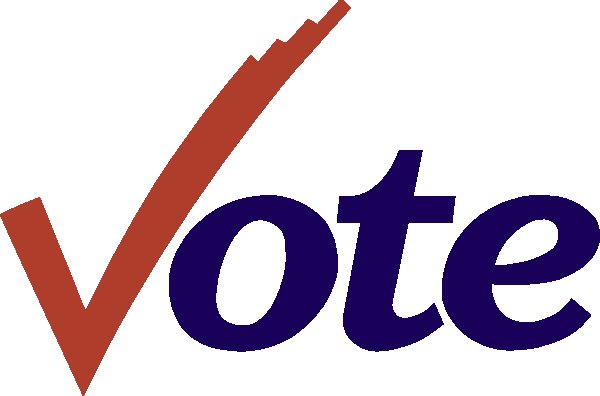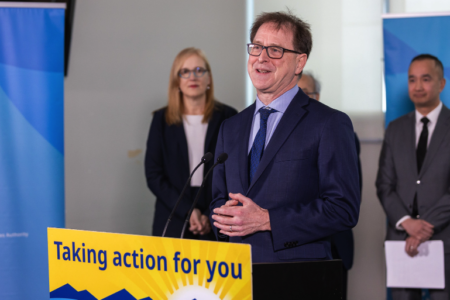ALL-CANDIDATES' FORUM
A Report, Ending with Personal Impressions and Conclusions.
For those who couldn’t be there: The Trail Chamber of Commerce forum was well-attended and well-managed, and it was fascinating to observe the different candidates in action.
First: the Set-up
Five candidates attended — for the NDP, Liberal, Conservative and Green parties, plus one of the two declared Independent candidates. There appeared to be nearly 200 people in the audience.
The forum was moderated by Catherine Adair. Each candidate made an opening statement for two minutes, then members of the audience lined up to direct questions, each to one individual candidate. Questions were limited to one minute each, and the candidates’ responses were limited to two minutes each. All candidates were issued two “wild cards” that they could use to respond, for one minute only, to a question asked of another candidate. Refreshingly, there was no interruption or heckling.
After the time allotted for audience questions, each of the three press attending was allowed to pose one question, which was answered by each of the candidates in turn. And, finally, each candidate answered one “set” question: “What concrete initiatives will you champion to address the on-going supply challenges of skilled workers?”
Next: The Candidates
In alphabetical order by last name, the candidates were — as most of you already know — Richard Cannings, NDP; Connie Denesiuk, Liberal; Brian Gray, Independent; Marshall Neufeld, Conservative; and Samantha Troy, Green.
And What They Said: Opening Statements
Cannings (NDP), a biologist and author, explained what inspired him to enter the political arena. He referred to “how dysfunctional parliament has become,” with an “all-powerful Prime Minister’s Office, and committees that don’t allow opposition amendments” and to the income gap between the rich and the poor, and how scientists with Environment Canada “despair at the degradation of our water and air, and how little they can say about it.” He promised affordable childcare, and a universal pharmacare program, and to ensure that big corporations would “pay their fair share.” He promised that an NDP government would bring in a form of “proportional representation, so that everyone’s vote will count.”
Denesiuk (Liberal) said that this election “offers a clear choice between “jobs (with) growth, and austerity (with) cuts.” She promised that if the Liberals formed government, they would “invest now, to build a better future.” She said they would “double infrastructure spending to $125 million over the next ten years.” This would create jobs and stimulate the economy, she said. She promised to “end legislation based on fear and ideology” and “bring back science-based legislation, and the long-form census, and listen to what scientists have to say, even if what they say is inconvenient.” She said she is known for “getting things done.” She also asserted that “better is not only possible, but essential.”
Brian Gray (Independent) stated that his campaign offers an “alternative to the status quo.” He said that our “country is reliant on a financial system that is based in London and New York,” and spoke of other weaknesses of our economy and the “emerging threats” to it. He urged Canada to become a “true sovereign nation” by reinstating bank regulations in our country, and to nationalize our Federal Bank, develop our Arctic “in a sustainable manner,” and “commit to nuclear energy .. re-commit to our space program and work with other space-faring nations such as China and Russia in their lunar exploration programs,” and “withdraw from NATO and withdraw all funding for the British monarchy.” He favours joining the BRICS nations.
Marshall Neufeld (Conservative) spoke of his desire to serve, and of his first career in health care. He spoke of his time working with Stockwell Day, and of putting his clients’ interests first. He has served one term as vice-chair of the Penticton Christian School Board. He promised that if he is elected, he will “endeavour to serve you by advocating for our region, in Parliament, through the maze of government bureaucracy” … “serving you by speaking up for legislation that will put you first, allowing for individual choice, and less government regulation, and seeking to keep our taxes low.” He hopes to “build on the Conservative principles of providing strong economic leadership, expanding free trade, and keeping our communities safe.”
Samantha Troy (Green) stated that “Canadians need an economic plan which invests in people, creates good jobs, focusing on skills, knowledge and responsible, sustainable resource growth.” She proposed a “Council of Canadian Governments … federal, provincial, municipal, local, as well as First Nations, Métis, and Inuit leaders,” to “develop national goals, publicly and transparently.” She also committed to “bold climate action, by embracing solutions which we already know work,” and to “implementing evidence-based policies, and making transparent our federal scientists’ work.” She also promised democratic reforms such as proportional representation for our Parliament and Senate, for greater accountability and inclusivity.
Questions from the Audience:
The first question was a rambling enquiry about bill C-51, American incursions into Canadian airspace, surveillance by drones, and the dangers of toxic “chem-trails” and what a government would do about all of these things. When prompted to direct the question to one candidate, the questioner put Richard Cannings on the hot-seat for this one. Cannings spoke of Bill C-51 as “unnecessary and dangerous” and committed to repealing it. He asserted that Canada already has adequate legislation to combat terrorism, that bill C-51 threatens ordinary Canadians’ rights and freedoms and fails to provide for adequate oversight of enforcement agencies. As for “chem-trails” he said that he has looked into the issue because he was aware of concern from a number of people, but that no atmosphere scientists have found any evidence at all to support the chem-trails conspiracy fears.
Subsequent questions elicited promises from —
NDP Richard Cannings: to invest in creating 5000 more nursing home beds, and a $30 million dollar fund for research and support for dementia; creating a pharmacare plan so everyone can afford to fill their prescriptions; to NOT bring back the long-gun registry; to take strong actions to reduce green-house gas emissions; to bring in a mixed-member proportional representation electoral system with local representatives; to move away from reliance on fossil fuels and toward renewable sources of energy; to implement the NDP cross-Canada food strategy, supporting Canadian food producers and food security, and to continue research into food production; and to “allow” GMO labeling.
Liberal Connie Denesiuk: to provide additional funding to support seniors’ ability to stay in their own homes; to run deficits for 3 years in order to invest in infrastructure in order to stimulate the economy, then to balance the budget and achieve a surplus; to NOT bring back the long-gun registry; to put money into “environmental infrastructure” and developing green energy; and to invest in social infrastructure, including affordable housing; to providing more assistance for people with mental health and addiction issues; ; to “help the middle class” (families earning between $45,000 and $90,000) with an improved child tax benefit.
Conservative Marshall Neufeld: to run the government with a balanced budget; to NOT bring back the long-gun registry; to be honest and trustworthy; to bring in an elected Senate; to NOT bring in a carbon tax; to continue to “regulate” emissions; to NOT bring in a system of proportional representation for the House of Commons, to maintain “physical geography” as the “primary determining factor” of representation there; to stabilize prices by “supply management.”
Green Party Samantha Troy: to invest heavily in literacy and education and training, and to abolish tuition for post-secondary studies by 2020; to bring back the long-form census; to work to end American-style attack politics in Canada and cut the Prime Minister’s Office budget by 50%; to bring in a proportionally-elected Senate, as well as proportional representation for the House of Commons; to bring in a requirement for a 2/3 vote of Parliament to prorogue it; to support local food and small-scale producers, and to shifting government-supported research away from buying technology and energy-intensive farming, and toward organic and sustainable food production; to address our large multi-national trade deals and the investor-state resolution mechanisms included in them, which are affecting our ability to access local, affordable food.
A Few Personal Observations, Opinions and Conclusions which reflect my personal biases:
Marshall Neufeld is the only candidate who made a point of mentioning his religion in the forum. He seemed somewhat defensive about the Harper government, and tended to rely on what he claims it has done in the past, rather than making much in the way of new commitments for the future. He made some statements about what it has accomplished that may not be supported by evidence, such as implying that the current régime is responsible for lowering greenhouse gas emissions (which are actually rising, and fell only briefly during a sharp recession). Neufeld was the only candidate who selectively quoted other parties’ leader’s statements from many months ago to attempt to discredit their candidate’s statements about the defunct long-gun registry. Neufeld seems to be a very nice young man who means well, but appears to me to lack the ability to critically analyse his own party’s actions and policies, and seems unwilling to accept evidence that conflicts with what he wants to believe.
Independent Brian Gray is a climate change denier, so he lost me there. He also supports nuclear energy, so he lost me all over again, unless he can tell me how he has discovered a fool-proof, safe method and location for long term storage of nuclear wastes for many tens of thousands of years, and how he can guarantee that the newly and increasingly more-intense weather events that are part of climate change have no chance whatsoever of affecting a nuclear installation.
Connie Denesiuk was the most dynamic speaker, and is a very likeable person. My reservations are more about her party and its support of Bill C-51, and its support of fossil fuel production in Canada, which seems in conflict with a declared intention to transition away from fossil fuels. For me, it’s a problem that her party has not committed to bringing in proportional representation — just to “studying” various alternative electoral systems, and making some unspecified change before the next election.
Richard Cannings appears to know his stuff and to be a thoroughly decent human being, though he is not the most consistently compelling speaker. If he became our representative in Parliament, I think it would be his votes on decisions to be made by Parliament that would be his most important role for Canada as a whole. His work on behalf of his constituency would probably be as effective as anyone’s, as he appears to do very well in one-on-one or small-group conversations. I like his commitment to bringing in a system of proportional representation, and that he recognizes the urgency of climate change. I know that many local people plan to vote for him because he appears at this time to represent this riding’s best chance of an MP who is not a member of the “Harper Conservatives.”
Samantha Troy seemed a bit tired at the forum, but did a very good job of articulating Green Party positions and intentions. The Green Party seems to me to have the body of policy that best represents what most needs to be done, and what most Canadians really want Canada to do and to be. However, as noted above, a number of people who would normally vote Green are, for this election, planning to vote strategically instead.
This is truly a watershed election. I have never before stayed up late to listen to election results, but this one will compel me to hear it out. For the sake of our country, please vote — I’d love to stay up even later because there are so many votes to count!

























